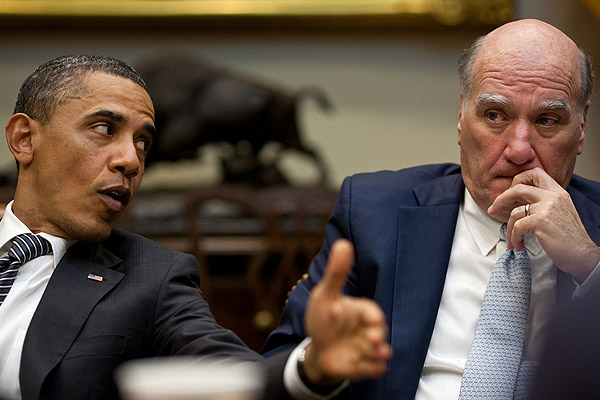
In her 2005 profile of just-departing White House chief of staff Bill Daley, Carol Felsenthal described a power player with a gift for bipartisan congeniality and an ambivalence to details:
He maneuvered the passage of the North American Free Trade Agreement (NAFTA) in the U.S. Congress and lobbied on behalf of the telecommunications giant SBC, but his supporters say that he probably never mastered the details of those operations. Still, people who have worked with him (and against him) credit Daley with remarkable savvy. “If you asked Bill the difference between Cicero and Plato, he wouldn’t know,” says the Chicago lawyer and Democratic stalwart Wayne Whalen, but he possesses a “keen intelligence” on how to plot strategy, to predict how people will behave in a given situation, to see beyond conventional wisdom.
[snip]
Today, Daley’s friends say, he can pick up the telephone and call almost anyone, from Arizona Republican senator John McCain to the Citigroup chairman, Sandy Weill. At the peak of the election-night chaos in 2000, Daley called his friend Tom Brokaw, the NBC anchor, to trade the latest news on the Florida returns. Many of his best friends are tough-guy players in the mold of Dan Rostenkowski, once considered the most powerful man in Congress. Danny and Billy, as they call each other, share a love of golf and results; they are what Daley calls results rather than process Democrats—people who want to “get something done,” not people who go to Washington “and it’s all about the purity of the process.”
It's not a terribly surprising move. Daley had the nuts and bolts of the job moved out from under him back in November, shortly after the speech-scheduling flap, as he was slated back into the negotiatior role he's obviously experienced at. But even that was a tough fit in the current political environment, and brought him more criticism:
But the partisan makeup of the House doesn’t excuse what some Democratic officials have described as a too-quick-to-compromise legislative strategy. During the government shutdown talks with Republicans this past spring, Daley signed off on billions in cuts that congressional Democrats were, at that point, unwilling to make, according to a source familiar with those negotiations. The party ultimately ended up offering additional cuts beyond that. But as the final deal went through, several Democratic sources said lawmakers were smarting over what they viewed as a preemptive, uncoordinated concession.
The House, right now, doesn't reward congeniality; it's less lobbying than it is trench warfare. It's hard to find praise for Daley's tenure as chief of staff, but Greg Hinz gives him credit (and a scoop about his future with the Obamas):
[U]nder his watch, a president who was all but left for political dead when he came aboard right after the 2010 mid-term elections not only has edged back into the 2012 game put probably again is the favorite.
Osama is dead, at least a short-term budget deal in hand, the U.S. withdrawl from Iraq completed, and Republicans on their heels. All of those are, to one degree or another, to Mr. Daley's credit — even if he's the kind of guy who would rather hammer it out in a bipartisan deal than an all-out war.
It's hard to say. Daley's gotten due credit for the passage of the American Jobs Act, but it's hard to see how the chief of staff has much to do with the killing of Osama bin Laden. The chief of staff's reputation rests a lot on political undercurrents he or she has little to do with. And as Jamelle Bouie points out, it's a job that has about as much security as Bears quarterback:
One thing to keep in mind as the media discusses this change: White House chiefs of staff aren’t known for their longevity—there have been 15 in the last 30 years, with an average tenure of about two and a half years.
George H.W. Bush went through three in his first (and only) four years, so Obama isn't alone in the turnover.
Update: In September of last year, when Daley's tenure was starting to split at the seams, Carol Felsenthal compared and contrasted Daley and Emanuel:
In these remarkably similar portraits that popped up late last week and continued into this weekend, Daley is the anti-Rahm Emanuel—his door closed against the messiness of politics, the irritating half-formed or contradictory opinions and the Obama people who had once delivered them to his ear or, almost as good, to Rahm’s. (Rahm’s door, it’s often noted, was almost always open, in part as a tactic—his profane tirades intended to intimidate the ill-prepared, slow-thinking, or slow-moving.)
Photograph: The White House



